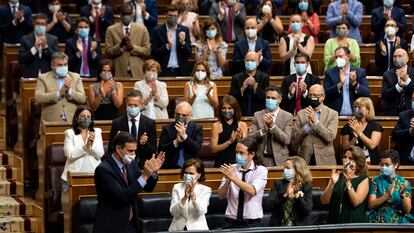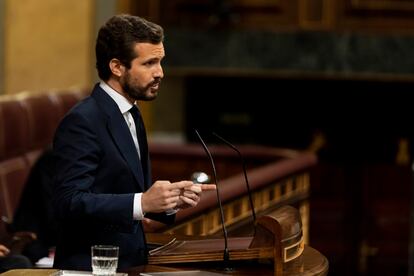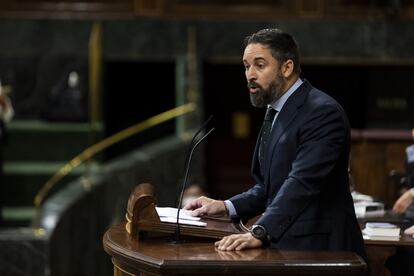Spain’s PM asks for spirit of consensus to aid recovery
Pedro Sánchez gave Congress details of the recent EU coronavirus fund deal and urged the opposition to be open to similar agreements back home

Spanish Prime Minister Pedro Sánchez on Wednesday urged political parties to work together towards national reconstruction in the same spirit that recently yielded a landmark EU coronavirus recovery fund.
“Nobody would understand it if such different governments had managed to reach an agreement in Europe, yet we were unable to do the same in Spain,” said the leader of the Socialist Party (PSOE), holding up as an example the EU agreement that will grant Spain €140 billion for the Covid-19 recovery effort.
Sánchez, who heads a minority government in a coalition with the leftist Unidas Podemos, addressed lawmakers before Congress goes on summer recess to explain the details of the EU deal, and asked for a similar spirit of consensus at home in order to create a more modern, digital, sustainable country.
“I hope that this historic European deal will serve as an example, as an incentive, and that it will make us all take a look in the mirror.”
Sánchez said that the €140 billion allocated to Spain over the next six years should help give the country “more sustainable pillars, in order to be stronger and more competitive. If Spain wants to, Spain can.”

But the speech made little impact on the opposition. Pablo Casado, head of the conservative Popular Party (PP), instead criticized Sánchez for playing a minor role in the EU debate, and described the EU funds as “a bailout.”
Casado underscored the fact that coronavirus cases are surging in Spain again, calling it “the most out-of-control situation” in the entire EU. He said that the government continues to do nothing to prepare for new outbreaks, and that it is ignoring the PP’s suggestions for reforming ordinary laws to avoid having to decree national emergency states in future.
Taking up Sánchez’s comparison of the EU recovery fund with the Marshall Plan, the PP leader recalled that the post-WWII aid package was meant “to prevent communism, not to sponsor it,” in a reference to Sánchez’s leftist coalition partner Unidas Podemos. Casado said that his party would show loyalty, but urged the prime minister to “choose between Spain and his partners, between stability and extremes.”
Vote of no confidence

Meanwhile the far-right Vox – which is the third-largest force in Congress with 52 lawmakers – announced that it will call a vote of no confidence against Sánchez in September. Vox leader Santiago Abascal called the Spanish government “criminal, illegitimate and unscrupulous.”
“Don’t you even think about locking us up again, because we won’t put up with it,” warned Abascal, alluding to the three-month lockdown to fight the spread of the coronavirus.
The announcement comes two years after Sánchez himself led a successful no-confidence motion against then-Prime Minister Mariano Rajoy of the PP.
Vox leader Santiago Abascal urged the PP to back the no-confidence motion, but the mainstream conservatives responded with silence. Even with support from the PP’s 88 lawmakers, the motion would fall significantly short of the absolute majority of 176 votes required in the 350-strong chamber. Teodoro García Egea, secretary general of the PP, dismissed the move: “Don’t count on us for distraction tactics that will only serve to reinforce the PSOE.”
Other parties in Congress reacted in a similar way. ”This motion is not against Sánchez, it’s against Casado,” remarked Gabriel Rufián of the Catalan Republican Left (ERC).
Rufián also warned that the EU funds will come with conditions that are “restrictive” rather than “progressive” if the views of the so-called “frugal” members of the EU are adopted. The Spanish government has already postponed an earlier pledge to fully or partially repeal labor legislation introduced by Rajoy that made firing cheaper. This lack of action has angered left-of-center parties, which note that the Spanish government still needs to secure enough support for its 2021 budget plan.
English version by Susana Urra.
Tu suscripción se está usando en otro dispositivo
¿Quieres añadir otro usuario a tu suscripción?
Si continúas leyendo en este dispositivo, no se podrá leer en el otro.
FlechaTu suscripción se está usando en otro dispositivo y solo puedes acceder a EL PAÍS desde un dispositivo a la vez.
Si quieres compartir tu cuenta, cambia tu suscripción a la modalidad Premium, así podrás añadir otro usuario. Cada uno accederá con su propia cuenta de email, lo que os permitirá personalizar vuestra experiencia en EL PAÍS.
¿Tienes una suscripción de empresa? Accede aquí para contratar más cuentas.
En el caso de no saber quién está usando tu cuenta, te recomendamos cambiar tu contraseña aquí.
Si decides continuar compartiendo tu cuenta, este mensaje se mostrará en tu dispositivo y en el de la otra persona que está usando tu cuenta de forma indefinida, afectando a tu experiencia de lectura. Puedes consultar aquí los términos y condiciones de la suscripción digital.








































